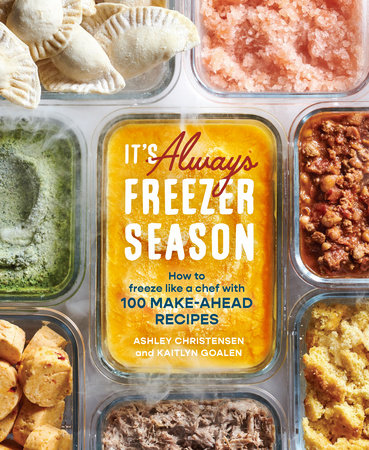Excerpt
It's Always Freezer Season
Introduction: Why the freezer?Both of us love to cook. When we wake up in the morning and choose to cook at home, it is soothing and meditative and fun—an activity that brings us happiness. On those days, it’s a luxury to spend a few hours on a single recipe—maybe the music is playing; maybe the windows are open or friends are helping; maybe it’s a cold day and the warmth of the stove is making the house cozy. It’s a joy.
But even the most beloved activities can be sucked of their pleasure when you are compelled to participate, rather than making the choice. Cooking as a necessity is labor. Whether we do so professionally or simply to feed ourselves or our families, most of us are required to cook daily. Even the most food-loving cooks we know get burned out on the labor of making dinner now and then.
On those nights, you might have options: you may go out to a restaurant; you may pick something up or have it delivered; or you can cook something, even when you don’t want to. The latter option becomes much more appealing when you have a freezer of dishes that you’ve cooked on a day when you felt the joy and happiness, rather than the labor, of cooking. A freezer full of the recipes that you’ll find in this book is like a savings account of emotional and physical sustenance: draw on it when your day-to-day stores are low.
In this age of obsession with the freshest, most seasonal food and the most cutting-edge flavors and techniques of top restaurants, the freezer may seem like a rather dowdy topic for a cookbook, especially for one cowritten by a professional chef. Freezers feature prominently in the make-ahead recipes of meal-prep blogs, but they rarely get top billing in cookbooks.
Hopefully, by the time you’ve cooked your way through even a few of the recipes in this book, you’ll come to the same realization we have:
The freezer, more than any other appliance in the kitchen, will help you cook delicious, flavorful meals in less time. It is at the intersection of quality and taste, approachability and convenience.
The time-saving aspect needs to be contextualized: We’re not shaving hours off the clock by cutting corners. There are recipes in this book that require a time commitment because making great food takes time and work. (We should know; we do it for a living.) Instead, we’re focused on the idea that you should squeeze as much out of each cooking session as you can. For example, if you’re going to spend a few hours making a stock, don’t just make enough for one recipe of soup. For almost the same amount of effort, you could make double the stock, freeze half, and thus save yourself time on the next occasion you crave a bowl of something hot and delicious.
Using your freezer more strategically and thoughtfully delivers other benefits, too: it can help you avoid food waste and save money, preserve seasonal ingredients to enjoy throughout the year, and entertain on the fly or provide a meal for a friend or family member who needs the assistance.
We get asked a lot about our “secret weapon” in the kitchen. Home cooks are understandably curious to know what the tools and tricks are for cooking more delicious food. Well, when we’re at home, our secret weapon is definitely the freezer. Our freezer is the MVP of our kitchen and the single most important “kitchen tool” we have, as it allows us to cook our favorite things in a way that best satisfies our home-cooking philosophy. Through smart and strategic use of our freezer, we are able to cook deliciously, avoid food waste, and save time by maximizing the time we spend in the kitchen.
With this book, we’ve laid out our game plan for you to do the same. We love these recipes, and we hope you do, too. But even more so, we hope this approach can inspire in you new possibilities and renewed joy for cooking.




